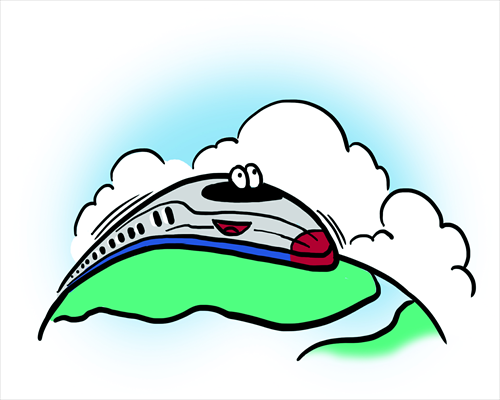High-speed rail can take slower approach in risky overseas markets

Illustration: Liu Rui/GT
Railway construction plays an irreplaceable role in infrastructure. Especially as economic growth declines, infrastructure investment becomes key, and large-scale projects more common, as we've seen in countries like Brazil and Mexico.
But the Brazilian government, which is eager to build its first high-speed railroad connecting Sao Paulo, Campinas and Rio de Janeiro, has added an extra condition requiring that operators are not allowed to participate in the bid if they have had major accidents in the latest five years.
The fatal Wenzhou crash of two years ago has thus shut the door for Chinese high-speed rail companies that wanted to enter the Brazilian market. This issue highlights the export dilemma of China's high-speed rail technology.
Many indicators show that China has a solid foundation to export its high-speed rail technology.
It has built a primary network of high-speed railways of over 10,000 kilometers, the largest in the world. From 1954 to 1993, 105 foreign aid projects in Asian and African countries led by what was then the Ministry of Railways have enriched China's experience in rail export.
And with competitive advantages of high quality and low cost, China has made dramatic achievements in exporting railway transport equipment to the external market, which unprecedentedly reached $14.32 billion in 2011.
International marketing is the only road left to the prosperity of China's rail industry. But what really matters is when and how to hit the road.
The overseas expansion of the rail industry can be divided into three dimensions.
The first is trade in goods, which is mainly the export of transport equipment including locomotives, carriages, signal systems and rails. The second is trade in services, which is mainly the construction of railways in foreign countries. The third is trade in capital goods, which is running entire railway systems in foreign countries.
At each level, more strict requirements emerge. In the third case, it is not only necessary that the rail exporters, which include fundraisers, equipment manufacturers and contractors, must make sure their technologies and management are qualified, it also requires exporters satisfy importers' demands in project planning, social management and business environment.
For now, import countries that are desperate for the advantages of high-speed rail are in an unbalanced position when dealing with exporters. Their conditions are not qualified to handle such massive projects.
Many import countries cannot afford the gigantic investment in railway construction, and they often impose overly strict requirements on the bidders, whose risks are much higher, but the expected revenue is unacceptable.
What's more, the ineptitude of the importers in management makes the railway less efficient and secure in operation after the handover, which will damage the exporters' reputation.
Under such circumstances, China's rail industry has to lower its expectations, not blindly seeking high-level cooperation or exporting the most advanced equipment and systems. Otherwise, the risk of massive losses will be very high.
As for the Brazil project, there are still uncertainties in the whole plan.
Even if the project can be accomplished as expected, the build-operate-transfer model is likely to drag the operator into a deficit mire.
It is also possible that once Brazil's foreign investment policy puts more restrictions on operations, the operator might have to lose the right to operate the railway and bear the brunt of the blame if some major accidents happen.
China should resort to a more feasible strategy which is based on the first two levels of export. It is not necessary to compete for the highest level of cooperation if the project bears high risk.
China should be aware that unpractical plans and requirements demanded by importers will prove troublesome, and participation in the competition at the right time will produce more reciprocal results than blindly meeting the requirements of importers.
The author is a research fellow with the Chinese Academy of International Trade and Economic Cooperation affiliated to the Ministry of Commerce. opinion@globaltimes.com.cn